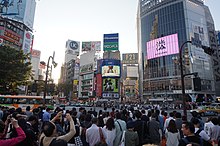Lost in translation
Lost in Translation is the second film written and directed by Sofia Coppola. It is a co-production between Japan and the United States, set in Tokyo and released in 2003. The film was nominated for four Oscars (best picture and Bill Murray for best actor), the director won the award for best original screenplay, and was also nominated for the best director category. It grossed $119 million on an initial budget of $4 million.
Plot
Bob (Bill Murray) is a movie star with no illusions, who travels to Tokyo to shoot a commercial for the Suntory brand of whisky and a series of commercials, interviews and Japanese advertisements. Charlotte (Scarlett Johansson) is a lonely young woman in her mid-twenties staying in the same hotel with her husband who works as a photographer. He is a famous advertising photographer who works around the clock. Bob receives absurd and cold calls from his wife, after 25 years of marriage; while Charlotte waits all day for her husband, to later see that he is not able to give her anything she expects.
One night, Charlotte sits next to Bob at the bar of the hotel they share, and from that day they both start seeing each other to spend the night together, having fun, talking, at karaoke, attending Japanese parties or even visiting a hospital. A connection immediately emerges between the two: feeling lost in the midst of many people and not finding their place in that big city. Despite their differences, Bob and Charlotte feel united by loneliness, both find in someone unknown an unusual feeling of tenderness and understanding that those closest to them are unable to give them.
As the days go by, Bob's departure date back to the United States gets closer and the two feel closer. When the day of Bob's departure to the United States arrives, the young woman says goodbye to him in the lobby of the hotel, but later Bob tries to look for her again to say goodbye to her properly, the two share a kiss and Bob leaves for the United States with his family.
Cast
- Bill Murray like Bob Harris
- Scarlett Johansson like Charlotte
- Giovanni Ribisi as John, husband of Charlotte
- Anna Faris like Kelly, John's friend
- Fumihiro Hayashi as Charlie Brown
- Akiko Takeshita as Mrs. Kawasaki
- Catherine Lambert as the jazz singer
- Takashi Fujii as the TV presenter
- François Du Bois as the pianist
Production and shooting
Sofia Coppola visited Tokyo several times, and her experiences during her visits greatly influenced the film's story. The director said she was attracted by the calm atmosphere of the Park Hyatt Tokyo hotel, where she begins the film, as well as the combination of cultures such as the New York bar and a French restaurant.
Coppola spent six months writing the script, initially a combination of short stories and impressions from his travels. His intention was to create a funnier and more romantic story than his previous film (The Virgin Suicides), mentioning that the film was a love letter to Tokyo.
The role of Harris was written for Bill Murray, according to the director, who tried to contact him on several occasions to offer him the role. For her part, Scarlett Johansson was selected by the director almost immediately, without auditions The production made intensive use of available natural light for filming, leaving aside the use of artificial light, and additionally no extra light was used for outdoor night shots. The filming inside the subway was done avoiding the attention of the local police with a minimum of personnel and a small camera to film.
The tape was shot almost entirely with a 35mm camera and a Moviecam Compact camera for shooting in small, space-constrained locations. Francis Ford Coppola, the director's father, suggested filming on video, but Sofia decided to use tape to give the images a romantic and melancholy feeling.
Criticism and reception
The film premiered at the Telluride Film Festival in 2003 and received a limited screening in several theaters in September of the same year. In addition to receiving positive reviews for the performance of Murray and Johansson, the writer-director also it was well received. On the specialized website Rotten Tomatoes the film has an approval rating of 95%. The site describes the film as "a story effectively balanced with humor and melancholy". The website MetaCritic for its part gave it a rating of 89/100.
Roger Ebert of the Chicago Sun-Times gave the film a rating of 4 out of 4 stars and called it the second best film of the year, describing it as " sweet and sad as well as sarcastic and funny". USA Today gave the film a rating of 3 and a half stars. positively viewed Murray's performance, calling it "a unique and fun performance".
Guardian critic Joe Queenan praised Coppola's skill, calling the film "one of the few Hollywood movies that isn't just smart, but has a soul" 34;. Rolling Stone magazine gave it a rating of 4/4 and wrote: "Before the leads whisper something to each other that the audience cannot hear, Coppola maintains an aura of intimacy on his tape with that whisper". A BBC poll of international critics voted Lost in Translation the 22nd best film of the 2000s.
The film was successful at the box office, since with an initial investment of $4 million dollars it achieved a total collection of $119.7, having a collection of €5,545,578 in Spain and $44,585,453 in the United States. The roles played by Bill Murray and Scarlett Johansson were highly acclaimed by the international press. So was the level of detail that Sofia Coppola managed to convey with her film. Elvis Mitchell, from The New York Times, published the following review the same year the film was released:
‘Translation’ [...] is (also) one of the most pure and simple examples of all the times of a director in love with the gift of his stars. And never a director has found a more deserving figure of his admiration than Bill Murray [...] the film follows the twists and connections in the relationship between Bob and Charlotte; as in some transoceanic calls, his feelings reach them with five seconds of delay. This delay only embellishs the comedy, and the desolation [...] Johansson escapes from his 18 years by making the role of a 25-year-old woman, using his voice to scramble the level of acidity in the air [...]Elvis Mitchell, The New York Times
The Japanese press received the film with negative reviews, such as the opinions of television critic Osugi: "The base story is not bad, it is cute; however, the way the Japanese are portrayed is terrible". Musician Kiku Day wrote for The Guardian: "There is no scene in the film where the Japanese have a single shred of dignity, the viewer sees them as an amusing mockery of those little yellow people." He also adds that & # 34; for the director of the film, good Japan is only Buddhism, singing monks, temples and flower arrangements; she portrays contemporary Japanese as ridiculous people who have lost touch with their own culture.
Author and filmmaker E. Koohan Paik wrote that "the film presents the Japanese as clowns instead of people. Removing the caricature of the Japanese, he leaves the tape with a flat humor, where the protagonists lose strength and the plot evaporates & # 34;.
Soundtrack
The soundtrack was supervised by Brian Reitzell and was released on September 9, 2003 by Emperor Norton Records. It contains five songs by Kevin Shields, including one by her group My Bloody Valentine. Coppola said that much of the soundtrack was made up of songs that she liked and had been listening to. She worked with Reitzell to make Tokyo dream pop mixes. Allmusic rated the soundtrack four out of five stars.
Academic Agathi Glezakos wrote a review of Lost in Translation shortly after its release, saying that the music from the film's karaoke scene constituted a common language that allowed Bob and Charlotte hook up with some of the Japanese. In that scene, The Pretenders' song “Brass in Pocket” was selected as a showcase for Charlotte's jovial side, and “What's so Funny 'Bout Peace, Love, and Understanding'; was chosen to indicate that Bob is from a different generation. Both Coppola and Murray ultimately selected the song "More Than This" from Roxy Music during the shoot itself because they liked the band and thought the song's lyrics fit well with the story.
Awards and nominations
The film garnered a total of 108 awards, in addition to 77 nominations.
Oscars
| Year | Category | Candidate | Outcome |
|---|---|---|---|
| 2004 | Best movie | Sofia Coppola Ross Katz | Nominated |
| 2004 | Best director | Sofia Coppola | Nominated |
| 2004 | Best actor | Bill Murray | Nominee |
| 2004 | Best original script | Sofia Coppola | Winner |
Golden Globes
| Year | Category | Candidate | Outcome |
|---|---|---|---|
| 2004 | Best movie - Comedy or musical | Winner | |
| 2004 | Best director | Sofia Coppola | Nominated |
| 2004 | Best actor - Comedy or musical | Bill Murray | Winner |
| 2004 | Best actress - Comedy or musical | Scarlett Johansson | Nominated |
| 2004 | Better script | Sofia Coppola | Winner |
BAFTA Awards
| Year | Category | Movie | Outcome |
|---|---|---|---|
| 2003 | Best movie | Nominated | |
| 2003 | Best director | Sofia Coppola | Nominated |
| 2003 | Best actor | Bill Murray | Winner |
| 2003 | Best actress | Scarlett Johansson | Winner |
| 2003 | Best original script | Sofia Coppola | Nominated |
| 2003 | Best original music | Kevin Shields Brian Reitzell | Nominees |
| 2003 | Better photograph | Lance Acord | Nominee |
| 2003 | Better assembly | Sarah Flack | Winner |
WGA Awards
| Year | Category | Movie | Outcome |
|---|---|---|---|
| 2003 | Best original script | Sofia Coppola | Winner |
Independent Spirit Awards
| Year | Category | Candidate | Outcome |
|---|---|---|---|
| 2003 | Best movie | Winner | |
| 2003 | Best actor | Bill Murray | Winner |
| 2003 | Best director | Sofia Coppola | Winner |
| 2003 | Better script | Sofia Coppola | Winner |
Venice International Film Festival
| Year | Category | Candidate | Outcome |
|---|---|---|---|
| 2004 | Best actress | Scarlett Johansson | Winner |
Phoenix Film Critics Society Awards
| Year | Category | Candidate | Outcome |
|---|---|---|---|
| 2004 | Best major actor | Bill Murray | Nominee |
| 2004 | Better photograph | Lance Acord | Nominee |
| 2004 | Best lead actress | Scarlett Johansson | Nominee |
| 2004 | Better direction disclosure | Sofia Coppola | Winner |
| 2004 | Best actress revelation | Scarlett Johansson | Nominated |
| 2004 | Best director | Sofia Coppola | Nominated |
| 2004 | Better script | Sofia Coppola | Nominated |
Cesar Awards
| Year | Category | Candidate | Outcome |
|---|---|---|---|
| 2004 | Best foreign film | Sofia Coppola | Winner |
Boston Society of Film Critics Awards
| Year | Category | Candidate | Outcome |
|---|---|---|---|
| 2003 | Best actor | Bill Murray | Winner |
| 2003 | Best actress | Scarlett Johansson | Winner |
| 2003 | Best director | Sofia Coppola | Winner |
Contenido relacionado
Theresa Wright
William H Macy
Panocho


